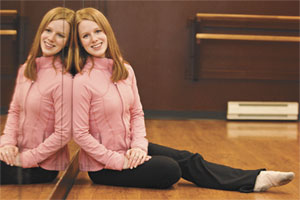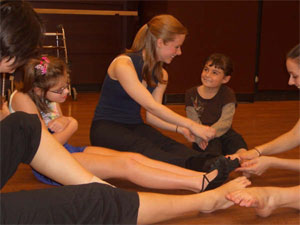 |
| Jen Loane at Halifax Dance. (Danny Abriel Photo) |
Uta Donahue didnāt know if her daughter would ever walk much less hop, skip, march or dance like a butterfly. But six-year-old Amelia has discovered the wind beneath her wings in a therapeutic dance class created by Dalhousie student Jen Loane.
āIt melts my heart to see her,ā says Mrs. Donahue. Her daughter, who is developmentally delayed and has a heart condition, just learned to walk a year ago. āThe dance class helps with her stability and her movement. Itās fantastic. Amelia loves everything about it.ā
Bedford mom Anne Shea echoes Mrs. Donahueās remarks. Going to the Friday night class is the highlight of the week for eight-year-old Emily. The little girl, who dons a black velvet skirt and purple slippers, uses a walker for mobility.
āItās been absolutely wonderful. Emily loves getting together with other kids with challenges ā¦ itās the one place where she fits in and that means everything to her.ā
Getting the class up and running is the dream of Ms. Loane, a student in the School of Health and Human Performanceās therapeutic recreation program. Since becoming a volunteer at Wee Care Developmental Centre, a day-care centre for disabled and able-bodied preschoolers, Ms. Loane wanted to create a special class where children could explore movement in a social setting. She pitched her idea to the Pediatric Rehabilitation Team at the IWK and the board of Halifax Dance. With their feedback and support, she held two trial runs last summer and the class was added to the official roster at Halifax Dance last fall.
 |
| Jen Loane with some of the children in her class. (Photo supplied) |
Balancing her studies with dancing, Ms. Loane teaches classes for three age levels of special-needs children experiencing a wide variety of challenges: cerebral palsy, spinal bifida, visual impairments, pulmonary and respiratory problems, Down syndrome and autism. Some come in wheelchairs, others use walkers. They learn to march, balance on one leg, stand in straight lines and express themselves through movement. Older children practice plies, tendus and graceful arm postions, just like other children taking ballet.
āI find theyāre completely taking on the dancer identity ā they love the outfits, the tights, the bodysuits, and the sweats with ādancerā on the bum,ā says Ms. Loane, whoās danced since the age of three. āComing here represents freedom for them. They can express themselves anyway they want to.ā
Besides the special needs classes, the diminutive 23-year-old teaches jazz, ballet and Pilates.Ā For the past four years, she has played the lead role of Clara in Halifax Dance/Symphony Nova Scotiaās production of The Nutcracker.
She graduated from Dalhousie with a degree in kinesiology in 2006, and returned last fall to get a second degree, this time in therapeutic recreation. While mulling whether to return to university, perhaps for occupational therapy or physiotherapy, she stumbled upon the class descriptions for the therapeutic recreation program. Two weeks later, she was back in the classroom.
āI wanted to find something where I could combine my knowledge of kinesiology with my love of dancing, and recreational therapy was the exact fit.ā
The childrenās parents say they couldnāt imagine anyone kinder, more patient or creative than Ms. Loane to lead the classes. āOh my goodness, she is so patient and positive,ā says Mrs. Shea. āShe is a real natural with these kids.ā
The classes are as important to the teacher as they are to the little dancers. āIt feels strange in a way (to get attention). I always knew Iād get here. This is what Iāve aspired to. Iām just glad to give a service to these kids whom I absolutely adore.ā
